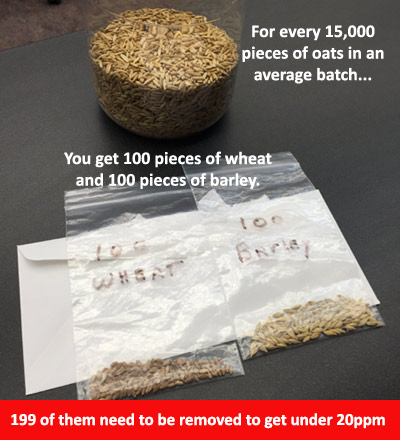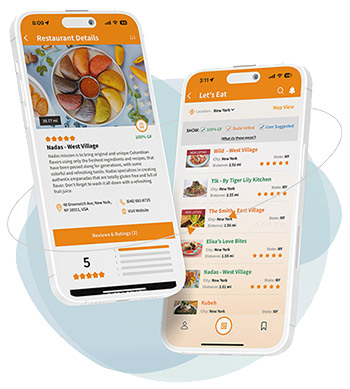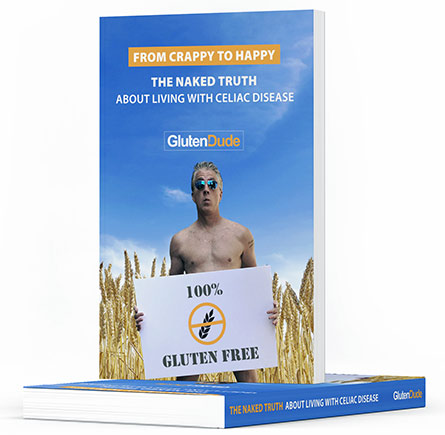Dude Update January 2023: Things have even gotten worse. This was posted by Gluten Free Watchdog just recently: In the latter half of 2022, four labeled gluten-free oat products from three manufacturers commissioned for testing by Gluten Free Watchdog had gluten test results above 20 parts per million. Three of the four products were certified gluten-free at the time of testing. These results are unprecedented for GFWD. Yikes!!
So I haven’t been sleeping. Like…at all. Went to bed last night at 11. Finally, at 6AM, after zero sleep, I gave up and went to work. What does this have to do with oats? Absolutely nothing. I’m just tired.
Ok…oats and celiac disease. Celiac disease and oats. What’s fact? What’s fiction? And why can’t I sleep (sorry)? Let’s go to Google and type in “are oats gluten-free” and see what comes up.
Celiac Disease Center: A large body of scientific evidence accumulated over more than 15 years has proven that oats are completely safe for the vast majority of celiac patients.
Beyond Celiac: “Be sure to use oats that are “pure, uncontaminated,” “gluten-free,” or “certified gluten-free.” Experts believe that up to 50g of dry gluten-free oats a day are considered safe.”
Bob’s Red Mill: “The short answer to the question of oats being gluten free is a resounding yes, however there are always considerations to think about if you have any kind of sensitivity.”
Gluten Dude (2015): “If they are grown/processed in the same facility that grows/processes other grains like wheat and barley, they are bound to be contaminated to the point they are not remotely safe.”
I think I speak for the community when I say HUH?
A quick history lesson about oats and gluten
Taken right from the Gluten-free Watchdog site, cause she’s a heck of a lot smarter than I am: “The main issue with oats is cross contact with wheat, barley, and rye. This cross contact can occur anywhere from the field to the mill to the food processing facility. Oats may be grown in rotation with or in proximity to wheat, barley, or rye. If so, it is likely that there will be errant wheat, barley, or rye grain growing in the oat field that will be harvested along with the oats. The same harvesting, transporting, and storing equipment/facilities may be used for oats as well as for wheat, barley, and rye. All of these factors contribute to the presence of wheat, barley, and rye grain in standard oats.”
Now…I’d like you to study the following picture. No…there won’t be a test.

Did you know that most gluten-free products that contain oats are not certified gluten-free oats? Meaning they are using oats just like the ones above. Yep…really cross-contaminated. Sure you’ve got your companies like Cheerios who say their product is safe because they have a “sorting process”. But the sorting process is NOT the same as using purity protocol oats. Purity protocol oats are those that are grown separately from other seeds.
Confident now? I didn’t think so.
Which brings us to exhibit A of why we can’t trust oats…
A company called Sogud had a recall. It seemed some of their gluten-free products…had gluten. Now I assumed the company made a bevy of products, some of which had gluten and some which didn’t, and a mistake happened in the factory. But after perusing their website, I noticed that ALL of their products were gluten-free. So how the heck did some of the products have gluten??? Curious mind (me) wanted to know. So I emailed them. Here’s how the conversation went down.
Sogud: Let me explain why we are withdrawing 3 of our 5 products. As a family business, we have created genuinely healthy, nutritious and tasty Gluten Free products because we care about people’s health, especially those struggling with food sensitivities and allergies. Because we work hard to uphold our high standards of production, we proactively test our products regularly for Gluten content. The latest test showed that our 3 oat bars where slightly over the gluten threshold of 20 parts per million. Since the 2 seed products (Seed & Apricot and Seed & Walnut Squares) were not affected we tested the oat ingredients being used and found 2 of the 3 oat ingredients were very high in gluten, which had caused the gluten spike in our products. This resulted in us withdrawing all our oat squares and making sure customers are aware of the high gluten levels.
So, you will probably wonder if we were using Gluten Free Oats to make our products. The answer is No, as to date the gluten content of oats has been extremely low. We don’t know why this has changed, but we are now using certified Gluten Free Oats to make sure this does not happen again. As you can imagine this is an expensive and very unpleasant experience!
GD, we would be happy to send you some of our Seed products to taste, and would love to hear what you think about them. Also, if you would like to write a blog about us to tell your community that some producers REALLY care and are trying to do things the right way, we would be delighted to do so.
Looking forward to hearing from you!
GD: Hi folks. Really appreciate the explanation. Two quick questions: 1) Aren’t the tests done BEFORE the products are put on the shelves. 2) Which brand of certified gf oats will you be using? Thanks.
Sogud: Yes, our products were tested in about May this year, to make sure we could use GF claims on our packaging. This last test was a routine retest, which as it turned out was just as well. We are sourcing GF oats as we speak, and retesting the made products to make sure the results are within the 20 ppm threshold., before allowing them back into the market. It’s painfully expensive and time consuming but we feel its essential to be sure our products are safe and we are confident in the Gluten content. As soon as we make a decision I will let you know who our supplier is.
And…end of story. So a few Dude notes here:
- This is not an attack on the company. They effed up, owned up to it, did a recall, and are changing the way they do things to hopefully make it safer for the celiac community.
- If the products were tested in May, how did they still get on the store shelves??
- Kinda humorous they offered to send me some of their products. I know it was done in good faith but still…
Now go back and look at that picture. Any gluten-free product that has oats that are not certified gluten-free has a decent chance to be over 20ppm. This is just a fact, no matter what the “experts” say. So the big question is…
Which companies are NOT using certified gf oats?
Things are never a constant in the celiac world. I strongly recommend you check out GF Watchdog, who has done a boat load of research on this. Here are a few of her articles:
– Oats and the Gluten-Free Diet: Q&A
– Oats produced under a gluten-free purity protocol: Listing of suppliers and manufacturers
– Gluten Free Watchdog Updated Position Statement on Oats
Bottom line? Buyer beware when it comes to oats. And as always…listen to your body.
Now…where was I. Oh yeah…







We have a much better system. In Australia no oats can be labelled gluten free because the protein in them is so similar that for about 20% of coeliacs they trigger the exact same auto immune reaction, even the uncontaminated ones, so we have to undergo an ‘oats challenge’ to make sure our villi aren’t blunted by oats before we can eat the certified pure ones. No gluten free products made in Australia contain oats.
That’s how it was here in the USA when I was diagnosed in the 1980s. I avoid oats because of that “ancient” advice. Can’t say I miss them
I’m booking a flight!!
That should be done in the US, also. I know many — and I suspect it could be as high as 20% — celiacs react to oats as if they are wheat. We are intolerant to the avenin in oats as well as the gluten in wheat. This is cross-reactivity, but I feel it is greatly overlooked in the US. Perhaps those who product all oats are behind this!!! Humm . . . .
GF Harvest developed purity protocol in 2004. They start with pure oat seed and follow all the way to the package. They are the only gluten free oats allowed to be imported into Australia. Their testing results have averaged, over the last 5 years, to be 99% of tests to be below detectable levels of <5ppm. They are a family owned business with 15 family members with celiac disease or gluten intolerance. They are available on Amazon. Check them out.
What has been your experience with products made with “certified” gf oats?
My daughter with celiac has always avoided all oats just to be safe.
I’d call the company and make sure they are indeed safe.
I have been avoiding oats because I always feel horrible after having them. I just assumed cross contamination somewhere. I never dreamed they would use regular oats in a Gf product. WTH! Another reason to eat Whole Foods!
To look after your own health best not to eat Oats or only do so after completing the challenge. Some great clarity in this from coeliac Australia. Of course contamination blows this question put off the water!
https://victas.coeliac.org.au/uploads/65701/ufiles/Position_Statements/CAPSOats.pdf
The term ‘gluten’ is used to collectively describe the parts of grain storage protein (‘prolamins’) from wheat, rye, barley and oats that are toxic to people with coeliac disease. The prolamins from each grain are called something different: Wheat – Gliadin; Barley – Hordein; Rye – Secalin; Oats – Avenin. In people with coeliac disease, ingestion of these prolamins results in an immune reaction.
I really feel like they just don’t give a shit about us! I switched to “gf harvest” oats. They only grow oats and do not process on shared equipment. They are the only oats that don’t give me symptoms.
Good to know…thanks.
Hey GD, I appreciate you continuing to try to educate the gf community on the concerns regarding oats. However, I have to remind you again that certified gluten-free oats DO NOT necessarily equal purity protocol oats. The certification organizations continue to certify oats and oat products as gluten free based on their testing results. It doesn’t matter to them if purity protocol oats are used. There are literally only a handful of companies that use purity protocol oats.
You are right to point folks to Gluten-Free Watchdog as she has shared again and again the data that shows that testing oats accurately for gluten content is very difficult. That is one reason it’s so very important to use purity protocol oats that are certified gluten free and products made from purity protocol oats that are certified gluten free.
GFW is also maintaining the list of the companies that offer those products on her site. That is the info everyone who is gluten-free should be using before consuming oats. Note that her list has gotten shorter since she originally posted it because more and more companies are not looking out for the gf community and are using sorted oats. 🙁
Shirley
Thanks Shirley. I thought I made that clear in my post. Perhaps not.
I’m also a very strict GF, celiac safe type because my symptoms are OTT, though that’s not the only reason (why do more damage to myself?). So Purity Protocol is a big deal for me. Thank you for drawing attention to this important issue.
I long ago switched to buckwheat farina for breakfast, something called Pocono Cream of Buckwheat, made savory is my go-to for morning porridge (with yogurt and bacon). There are lots of hot cereal options out there besides oatmeal. Rice pudding is a great breakfast too, for those who eat grains.
Note to readers: Buckwheat is not a type of wheat! 🙂
Scientists agree that cannabis medicines cannot be called absolutely safe: for example, 10% of THC is propeptilectic, and also “improper” cannabis https://www.cbdornot.com/ treatment can have detrimental consequences for patients with cardiovascular diseases. But here doctors are exactly the ones who should find out: who, in what doses, with the prevalence of which substances cannabis can help.
To my greatest regret, nowadays the overwhelming majority of people tend to have a very disadvantageous tendency—they suffer from the brain fog day-in and day-out.
For these individuals, the continuous and endless struggle to focus and concentrate, memorize information and even hold an ordinary conversation is astonishingly frustrating.
However, there are a lot of those who have succeeded in overcoming brain fog condition.
I have done some in-depth research over this matter with an intention to help those who suffer from brain fog to defeat this adverse condition.
Over the course of my research, I kept stumbling on a promising number of promising information, and therefore I increased my own understanding of this particular matter.
In this very article, I plan to share the top 11 strategies to blast brain fog once and for all, thereby making it possible for you to reclaim your own brain back!
Best 4 Strategies to Blast Brain Fog Once and for All tonusjournal.com
https://ceres.co.nz/blog/no-oats-are-not-gluten-free-heres-why/
I think Australia and New Zealand know more about Celiac. I CANNOT eat oats in any form.
Noticed that Bakery on Main is now listed by GF Watchdog as being a Purity Protocol Oat…https://www.glutenfreewatchdog.org/news/oats-produced-under-a-gluten-free-purity-protocol-listing-of-suppliers-and-manufacturers/
I wonder if they fixed this since you made your post? Worth an update, perhaps.